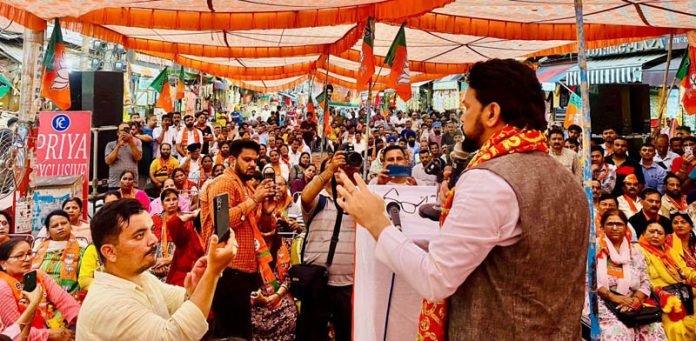Former Union Minister Anurag Thakur today launched a scathing critique of the dynastic politics in Jammu and Kashmir, attributing the region’s prolonged isolation from the national mainstream to the influence of three prominent families. Addressing a series of election rallies in Kishtwar, Nanak Nagar, Bishnah, and Nai Basti, Thakur condemned the historical political leadership for denying the people of J&K the constitutional rights enjoyed by citizens in other parts of India.
“The people here were deprived of the Constitutional rights that were available to citizens in other parts of India,” Thakur declared. He criticized the dynastic rule of the Abdullahs, Muftis, and Gandhis, alleging that their governance perpetuated a state of disconnection and deprivation.
Thakur emphasized the transformative impact of August 5, 2019, when Prime Minister Narendra Modi abrogated Article 370, a move he described as pivotal in altering the fate of Jammu and Kashmir. “On August 5, 2019, Prime Minister Modi abrogated Article 370, changing the fate of the deprived sections of Jammu and Kashmir,” Thakur asserted. He claimed that this decision ended the period of isolation and opened new avenues for development and integration.
According to Thakur, the removal of Article 370 was a significant step toward eliminating the barriers to progress and addressing the grievances of the region’s people. “When the BJP came to power in 2014, it took decisive steps to eliminate the biggest curse imposed by Congress in the form of Article 370. Finally, on August 5, 2019, this curse was eradicated forever,” he said.
Thakur criticized Article 370 for stifling development, reservation, and basic facilities, while instead fostering separatism, terrorism, and unrest. “Article 370 blocked development, reservation, and basic facilities, but instead, it fostered separatism, terrorism, and stone pelting,” he explained.
The former Union Minister accused the Abdullahs, Muftis, and Gandhis of failing to provide essential services despite their long tenure in power. He highlighted the plight of the Valmiki community, who were brought to J&K for sanitation work but were denied educational and reservation opportunities. Thakur also noted the neglect of the Gujjar-Bakarwal community, which received no reservation in the Assembly, and the denial of voting rights to refugees from West Pakistan.
Thakur announced that significant investments are being made in J&K, with Rs 25,000 crores already invested and an additional Rs 75,000 crores planned. He also discussed various government schemes, including the Jal Jeevan Mission, which aims to improve water supply across the region.
In conclusion, Thakur urged voters to support the BJP to continue the development process and prevent the resurgence of separatism, terrorism, and unrest. “Vote for the BJP in large numbers to continue the development process and prevent the resurgence of separatism, terrorism, and stone-pelting. Our goal is to make Jammu and Kashmir a developed State,” Thakur stated.



